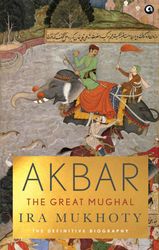Ira Mukhoty has been on a 624-page rescue mission in her new book. Akbar: The Great Mughal—the first to be released in physical form during the pandemic—is a brave, compelling attempt to fish out Akbar, the man.
Mukhoty stitches together the story of an ambitious man who stretched India’s boundaries further than anyone after him. Stunning in its scale and lush with details, she writes evocatively, conjuring up his court, life and times, the food, grand tents, the battles on the field and the ones he fought within.
For years, Akbar had been weighed down by The Great that followed his name. Mukhoty’s rescue mission brings alive the man, not as Abu’l Fazl’s version in Akbarnama but as a human. “He couldn’t have sprung up this perfect being,” says Mukhoty. “How did this person come to be? What were his challenges? Are they not similar to the ones India and the world face now?”
Abkar is the portrait of a 16th century monarch who discouraged sati and raised the minimum marriageable age. He was progressive—he even criticised Muslim laws of inheritance that favoured men. Yet, women became more sequestered during his time. Mukhoty, whose earlier books breathe life into women in Mughal history, explores this dichotomy. “Mughals are often accused of the purdah, but Rajputs also have the zenana (women’s chambers). In some ways, they both learnt from each other,” she says.
The book is littered with anecdotes: two-and-a-half-year-old Akbar wrestling his older cousin for a kettledrum, defeating his uncle Kamran’s attempts to humiliate him; a toddler Akbar recognising his mother—they had been separated for years—despite all the women in the court being dressed alike. He was a man who could not read, but loved knowledge. A man who knew the name of all his elephants, even though he had thousands of them.
Akbar could accept dissent. Mukhoty writes about the time he offered Man Singh discipleship. Man Singh refused saying he recognises only two religions, Hinduism and Islam. “He never pushed it again,” she writes.
While Mukhoty colours Akbar’s attributes for the 21st century reader, she also helps provide context to the Rajput-Mughal rivalry, as well as the legend of Rana Pratap. But it was not a simple black-and-white construct as Hindu vs Muslim or Indian vs foreigner. “There are two inscriptions on Rohtas Fort built by Man Singh,” she says. The Persian one talks about Akbar and heaps praise on him. Man Singh is barely mentioned. The one in Sanskrit talks about Man Singh being the king of kings. “There was a duality which had to be navigated,” she says. “This was complicated reality. There was a Mughal padshah and you were serving him. They had to navigate this, and they were doing it in innovative ways.”
Akbar: The Great Mughal by Ira Mukhoty
Published by
Aleph Book Company
Price Rs999, Pages 624


